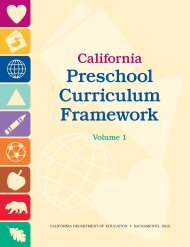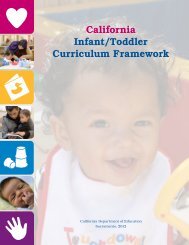California Preschool Learning Foundations - ECEZero2Three ...
California Preschool Learning Foundations - ECEZero2Three ...
California Preschool Learning Foundations - ECEZero2Three ...
You also want an ePaper? Increase the reach of your titles
YUMPU automatically turns print PDFs into web optimized ePapers that Google loves.
4.0 Cooperation and Responsibility<br />
At around 48 months of age At around 60 months of age<br />
4.1 Seek to cooperate with adult<br />
instructions but their capacities for<br />
self-control are limited, especially<br />
when they are frustrated or upset.<br />
Children strive to follow adult instructions to<br />
maintain a good relationship with the parent or<br />
teacher and because of incentives and rules.<br />
Children often become dismayed or distressed<br />
when corrected. Children have more difficulty<br />
complying with instructions when without adult<br />
support or when distressed or frustrated.<br />
Examples Examples<br />
• Plays gently with the classroom rabbit when<br />
reminded to do so by the teacher but may play<br />
more roughly on other occasions.<br />
• Seems sad and hides after the teacher comments<br />
on inappropriate behavior.<br />
• Smiles when the teacher comments on the child’s<br />
cooperative behavior while setting the table for<br />
lunch.<br />
• Hits another child when frustrated, then looks at<br />
the teacher.<br />
• Shouts angrily at another child, but looks<br />
confused or upset when the other child begins<br />
to cry.<br />
• Participates in classroom routines, such as<br />
cleanup.<br />
<strong>California</strong> Department of Education • <strong>Preschool</strong> <strong>Learning</strong> <strong>Foundations</strong>, Volume 1<br />
Social Interaction | 15<br />
4.1 Have growing capacities for self-<br />
control and are motivated to<br />
cooperate in order to receive adult<br />
approval and think approvingly<br />
of themselves.<br />
Children’s cooperation with adult instructions<br />
is more reliable because of better capacities<br />
for self-control. Children are motivated by adult<br />
approval and by a desire to view themselves<br />
approvingly for their good conduct, reflecting<br />
their acceptance of adult standards for<br />
themselves.<br />
• Tells another child to be gentle with the classroom<br />
guinea pig.<br />
• Suggests taking turns with another child who<br />
wants to ride the tricycle.<br />
• Spontaneously communicates, “I’m a good<br />
helper!”<br />
• Accidentally spills paint on another child’s artwork,<br />
then communicates, “I’m sorry,” or gets<br />
another piece of paper for the other child.<br />
• Communicates, “uh-oh,” and begins to pick up<br />
the pieces of a puzzle she has knocked off<br />
a shelf.<br />
• Works cooperatively with a friend to wipe off the<br />
table with sponges after lunch.<br />
• Responds cooperatively when his behavior is<br />
corrected by a teacher.<br />
SOCIAL-EMOTIONAL DEVELOPMENT
















